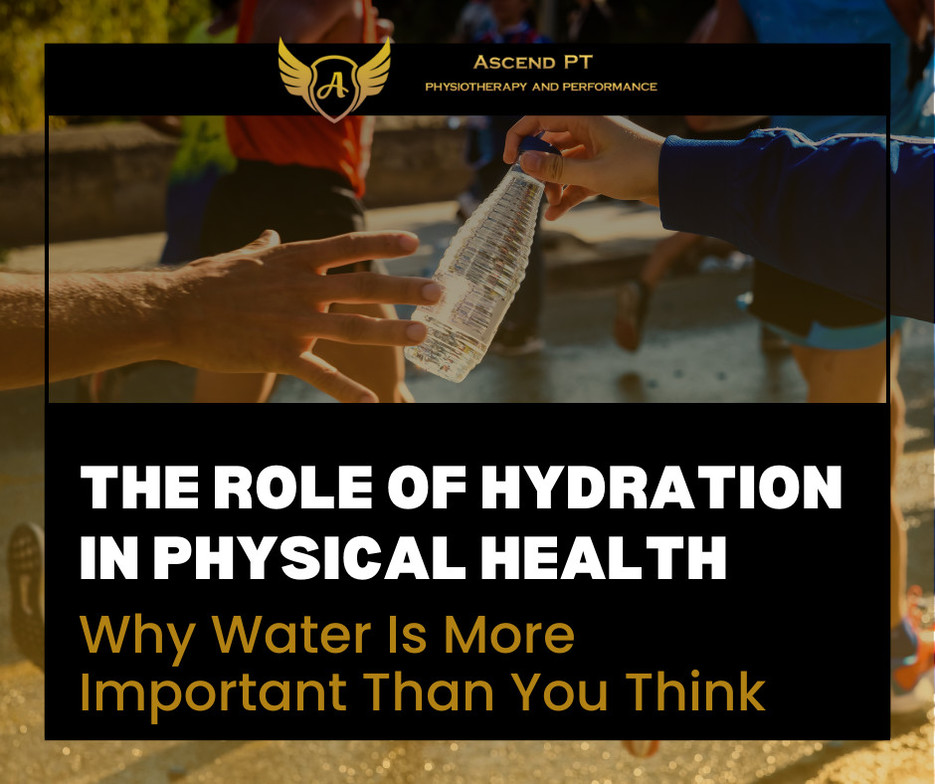
INTRODUCTION
Water is the essence of life, and its importance extends far beyond merely quenching your thirst. At Ascend PT Physiotherapy and Performance, we understand that staying well-hydrated is crucial for maintaining optimal physical health, preventing injuries, and supporting effective recovery. This blog delves into the vital role of hydration in your overall wellness and provides practical tips to ensure you’re drinking enough water throughout the day.
1. The Importance of Hydration for Physical Health
Water is involved in almost every bodily function, and maintaining proper hydration levels is essential for several reasons:
- Regulates Body Temperature: Water helps regulate your body temperature through sweat and respiration. Proper hydration is crucial, especially during physical activity, to prevent overheating and heat-related illnesses.
- Supports Joint Health: Synovial fluid, which lubricates your joints, relies on adequate hydration. Proper hydration ensures that your joints remain well-lubricated, reducing the risk of stiffness and discomfort.
- Aids in Nutrient Transport: Water facilitates the transportation of nutrients and oxygen to cells, helping your body perform efficiently. It also assists in removing waste products through urine and sweat.
- Enhances Physical Performance: Dehydration can lead to decreased strength, endurance, and overall performance. Staying hydrated helps maintain energy levels, muscle function, and mental focus.
- Prevents Injuries: Dehydration can increase the risk of injuries, such as muscle cramps and strains. Proper hydration ensures that muscles remain pliable and reduces the likelihood of cramping and other injuries.
2. Hydration and Injury Prevention
Adequate hydration is a key factor in injury prevention. Here’s how it helps:
- Reduces Muscle Cramping: Dehydrated muscles are more prone to cramping and spasms. Drinking enough water helps maintain electrolyte balance and reduces the risk of muscle cramps during and after physical activity.
- Improves Recovery: Post-exercise hydration is crucial for recovery. Water helps to flush out metabolic waste products and supports the repair and rebuilding of muscle tissues.
- Maintains Elasticity: Well-hydrated muscles and connective tissues are more flexible and resilient, reducing the risk of strains and sprains.
3. Tips for Staying Hydrated Throughout the Day
Incorporating hydration into your daily routine is essential for maintaining optimal health. Here are some practical tips:
- Set Hydration Goals: Aim to drink at least 8-10 cups (2-2.5 liters) of water daily. Adjust your intake based on activity levels, climate, and individual needs.
- Carry a Water Bottle: Keep a reusable water bottle with you throughout the day to make it easy to sip water regularly. Choose a bottle that you enjoy using to encourage consistent hydration.
- Use a Hydration App: Consider using a smartphone app to track your water intake and remind you to drink throughout the day.
- Infuse Your Water: If plain water is unappealing, try infusing it with fresh fruits, vegetables, or herbs like lemon, cucumber, or mint for added flavor and nutrients.
- Eat Hydrating Foods: Incorporate foods with high water content into your diet, such as cucumbers, watermelon, oranges, and leafy greens. These can help boost your overall fluid intake.
- Hydrate Before and After Exercise: Drink water before, during, and after physical activity to ensure you’re staying hydrated. For extended or intense workouts, consider consuming sports drinks with electrolytes to replenish lost minerals.
- Monitor Your Hydration Status: Pay attention to signs of dehydration, such as dark yellow urine, dry mouth, and fatigue. If you notice these symptoms, increase your water intake immediately.
4. Hydration and Mental Wellbeing
Hydration also affects your mental health and cognitive function. Proper hydration can:
- Improve Concentration: Dehydration can lead to difficulty concentrating and reduced mental alertness. Staying hydrated helps maintain cognitive function and focus.
- Enhance Mood: Adequate water intake is linked to better mood regulation and reduced feelings of irritability. Ensure you’re drinking enough to support both your physical and mental wellbeing.
5. Hydration and Weight Management
Drinking water can also support weight management:
- Promotes Satiety: Drinking water before meals can help you feel fuller, reducing the likelihood of overeating.
- Boosts Metabolism: Proper hydration supports metabolic processes and helps your body efficiently burn calories.
CONCLUSION
At Ascend PT Physiotherapy and Performance, we believe that hydration is a cornerstone of physical health and wellbeing. Ensuring that you drink enough water throughout the day supports your body’s essential functions, prevents injuries, and aids in recovery. By making hydration a priority and incorporating the tips provided, you can enhance your physical performance, prevent injuries, and improve your overall quality of life.
For personalized guidance on hydration and physical health, or to learn more about our physiotherapy and performance programs, contact us today. Let us help you stay hydrated, healthy, and moving at your best.
Dr. Alex Samuel
Contact Me

